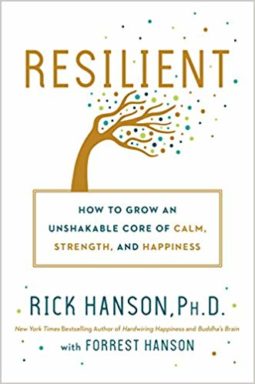There is a new book out by NY Times bestselling author Rick Hanson, Ph.D. called Resilient: How to grow and unshakable core of calm, strength, and happiness. Hanson’s previous books include Hardwiring Happiness and Buddha’s Brain.

The book is broken down into four parts, each with three chapters. Part One is Recognizing, which includes compassion, mindfulness and learning. Part Two is Resourcing, comprised of Grit, Gratitude and Confidence. Part Three is Regulating, covering Calm, Motivation and Intimacy. And finally, Part Four is Relating, which consists of Courage, Aspiration and Generosity.
One of the multitude of positive reviews and endorsements comes from Ronald D. Siegel, Psy.D., who is an assistant professor of psychology at Harvard Medical School and author of The Mindfulness Solution: Everyday practices for everyday problems. Siegel writes, “With humor, warmth, honesty, and a gift for making complicated ideas come alive, Dr. Hanson weaves together insights from neurobiology, modern psychology, and ancient wisdom traditions to provide easy-to-use tools to cae for both our heads and our hearts. This is an essential resource not only to survive but to grow during difficult times.”
In the opening acknowledgments, Hanson mentions the subject of neuroplasticity, which in short is the ability for our brains to recover and form new, healthier pathways of connectivity through learning and experience. This is a key factor in recovery from substance use disorders, in that the recognition of the ability for people to create lasting change means that they can permanently recover, and many people do. In other words, they don’t have to live the rest of their lives with the title of “addict” or “alcoholic,” and with tools and information found in wonderful resources like Resilient, a new day for the treatment industry is dawning. Centered Recovery is proud to be one of the growing list of programs that is on this path.






